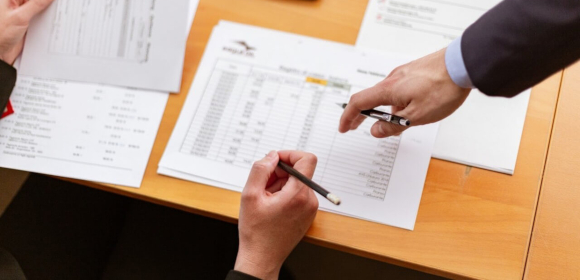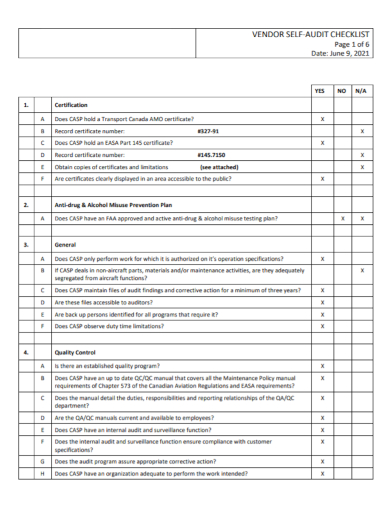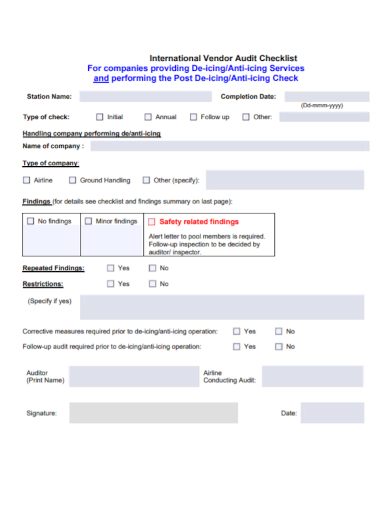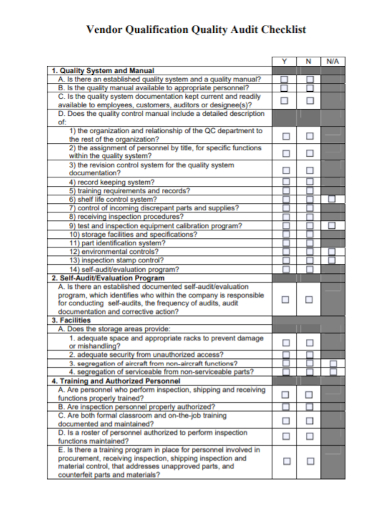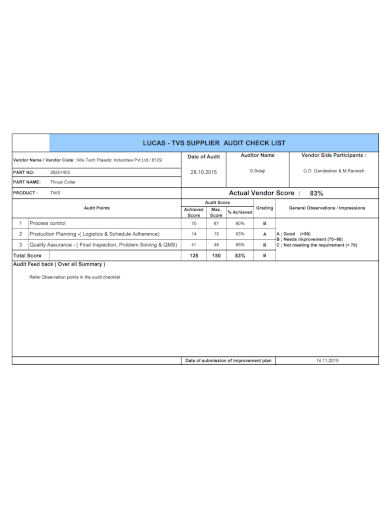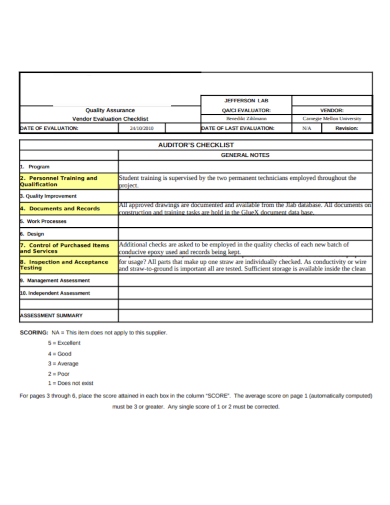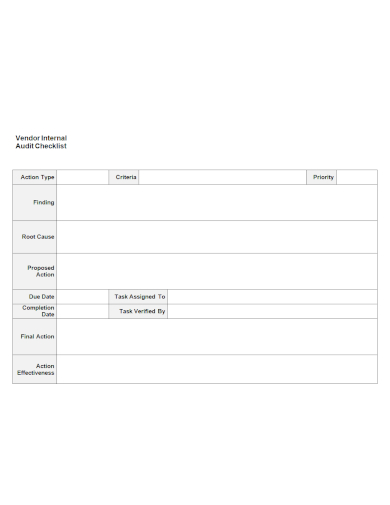Every business relationship comes with challenges and having one with their vendors isn’t anything new in the business world. No matter how long and strong a company and their relationship with their vendors may be, challenges and problems always get in the way. To keep their vendors in check and somehow strengthen their vendor relationship, it is imperative that business conduct a vendor audit. The need to conduct vendor audits stems from a higher need for quality control in an industry that needs to be more regulated than any other industry in the world. This is not to undermine their vendors but a way to check if the vendor’s performance, procedures and objectives are met as per contract. And this auditing is done through a vendor audit checklist. Read more about it in this article and check out our vendor audit checklist samples below:
5+ Vendor Audit Checklist Samples
1. Vendor Self Audit Checklist
2. Vendor Audit Checklist
3. Vendor Quality Audit Checklist
4. Vendor Supplier Audit Checklist
5. Vendor Evaluation Audit Checklist
6. Vendor Internal Audit Checklist
What Is a Vendor Audit Checklist?
A vendor audit or a supplier audit procedure is used by a number of industries to inspect and evaluate a vendor’s management system, as well as its practices, products, and documentation. This is done for closer monitoring of a vendor’s quality of performance and procedures stems from an ever evolving quality control market, and an industry where quality products are a necessity. Vendor or supplier audits are not limited to existing vendors but to prospective vendors as well, since companies tend to do an extensive research and vendor evaluation to make sure that they team up with the favorable partner. By using a vendor audit checklist this helps to ensure consistency and completeness in carrying out a task, covering all important areas as the auditing process commence.
How to Create a Vendor Audit Checklist?
One of the reasons companies use audits is to reduce cost and improve quality control. They do this by creating the leverage of expertise of product and service providers as an alternative, instead of creating their own. The system of vendor auditing is being used by different companies, in different industries all over the world, but overall it is a reliable business standard. A vendor audit checklist should not be limited to listing all the good and bad points. This should be an overall assessment and evaluation in which you can draw you conclusion from. The areas that need to be evaluated in a vendor audit are vendor viability, management responsibility, system accuracy, and data integrity. But as mentioned, vendor auditing may differ per company and the industry it is involved in. For a much more simpler and easier way of understanding, the following items should be included in your vendor/supplier audit checklist:
I. Quality of Management
Check if the vendor is able to meet customer requirements into a world-class quality product at a competitive price. Review how processes are performing as well as checking to make sure that objectives are clear for the business plan. The supplier needs to show how customer requirements are managed and taken into account in their product design. Aside from that strategic objectives, action plans, and other quality management system related requirements will be assessed.
II. Training and Knowledge
Employees working under your vendors or suppliers must be properly trained and certified. In particular in inspections, staff needs to have qualifications, the scope of authorization and period of validity defined. Certification history and records of qualifications are near the top of the list. Training manuals and assessments for job skills will be analyzed, as well.
III. Occupational Health and Safety
The specific environment, health, and safety checks may vary, yet the supplier has to have a process in place to avoid accidents, and ensure that the employee has undergo proper training and are healthy. Questions in your vendor audit checklist must revolve around checking procedures used for identifying hazards and control measures for issues.
IV. Production and Development
This should cover inspection of the products such as process and procedure to assure that inspection is done in a correct, standardized, and formalized way. And to make sure that the tests can be performed correctly. Quality of the production should comprise with inspecting samples from production.
V. Purchasing
To make sure that that the vendors are using the best and right raw materials used for the end products. Ensure that are all the technical, safety, delivery and quality requirements of the end product included in the supplier’s orders.
VI. Product Delivery
This should measure the timeliness of a vendor to deliver their products while assuring the quality of the delivered goods.
VII. Other Relevant Information In a Vendor Audit Checklist
As mentioned, depending on what industry you and your company is under in, you can consider including these items below:
- Customer Reports
- Incoming Material
- Manufacturing Quality
- Monitoring & Measurement
- Maintenance
- Environment
- Storage & Packing
FAQs
Why Is Vendor Audit Required?
A vendor audit is required as this can address the necessary requirements set by any governing agency and to align these with a company’s own policy and individual requirements.
What Is an Auditor?
An Auditor is a professional appointed by a firm to perform an auditing task. This individual should be certified by the regulatory authority of accounting and auditing or possess certain specified qualifications
What Is a Vendor or Supplier?
These are individuals or companies that supplies goods or services to a company. Generally, a supply chain vendor manufactures inventory or stock items and sells them to the next link in the chain.
Overall, the obvious benefit of regularly auditing your suppliers is that it significantly mitigates the risks that lead to loss of revenue. You can then track how your vendors or suppliers are performing against service level agreements or what was mutually agreed on the contract and more importantly identify any repeated problems.
Related Posts
FREE 19+ Sample Inventory Checklist
FREE 13+ Sample Quality Manuals
FREE 10+ Excel Scorecard Samples
FREE 10+ Sample Risk Assessment Checklist
FREE 10+ Accounts Payable Samples
FREE 10+ Trade Show Checklist Samples
FREE 9+ Stock Audit Report Samples
FREE 8+ Sample Check Register
FREE 5+ Procurement Management Plan Samples
FREE 34+ Assessment Samples
FREE 14+ Sample Training Checklists
FREE 12+ Health and Safety Policy Templates
FREE 10+ Company Profile Samples
FREE 10+ Contractor Management Procedure Samples
FREE 9+ Supply Agreement Templates
